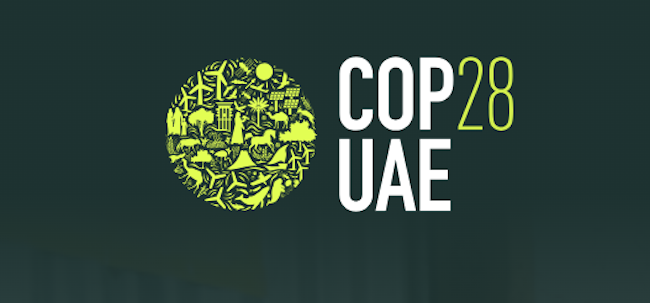The 28th United Nations climate summit will take place in Dubai, UAE from November 30 – December 12, 2023 with Sultan Al Jaber, chief executive of Abu Dhabi National Oil Company (ADNOC) as president of the summit. As world leaders, private sector representatives, civil society organisations, financial institutions, climate activists, environmentalists and the rest meet in Dubai, the stakes are high to chart a fast-lane approach to combat climate change.
In 2015 at the climate conference in Paris, about 199 countries signed to take action to limit global warming to below 2oC and not to exceed 1.5oC pre-industrial level by 2030. The latest United Nations Environment Programme (UNEP) emissions gap report, however, states that “2023 has already seen more than 86 days exceeding 1.5oC above pre-industrial levels” with the year shaping up to being the warmest on record. Earth’s temperature rise points to a grim outlook of a 50 per cent likelihood, exceeding the Paris 2015 target as early as six years from now if greenhouse gas emissions continue unabated according to a recent study.
Historically, CO2 emissions from fossil fuels is the main driver of the increase in greenhouse gas emissions accounting for two-thirds of the current global GHG (Greenhouse Gases) emission. In retrospect, wealthier nations are largely responsible for the warming of the planet as such renewed commitment is expected to tackle the climate-induced catastrophes.
Africa is at a crossroads owing to its high-risk status to climate change-induced vulnerabilities. The recent Africa climate summit in Nairobi, Kenya highlighted the continent’s resolve to tackle climate change impacts across member states. The COP28 summit would aim to galvanise global resources, capacity, inclusiveness and actionable solutions towards enhanced collaboration among the parties to tackle climate change.
- I inherited gun factory from my father – Suspect
- Over 1,000 youths, couples undergo marriage counselling in Kano
Land regeneration and restoration:
Land degradation in Africa poses a big challenge to the attainment of the UN’s Sustainable Development Goal (SDG) 15: “Life on Land” and the United Nations Convention to Combat Desertification (UNCCD) target of “Land degradation neutrality by 2030” which aims to restore degraded lands, improve food security, curb biodiversity loss and sustainable means of livelihood for millions across the globe.
In a twinkle of hope, some countries in Africa such as Madagascar, Ethiopia, Eritrea, Somalia and Mauritania recorded reduction of degraded land of between two and eight times larger in 2019 as compared to 2015, according to the UNCCD report. The Africa Great Green Wall (AGGW) had recently onboarded Somalia (12th nation) as a partner in the African Union’s (AU) inspired project which could potentially expand the span of the green corridor from 7,775km to 9,000km of regenerated native landscape.
The initiative aims to restore an estimated 100 million hectares of land and sequester 250 million tons of carbon and create 10 million green jobs for communities along its stretch in the Sahel, sub-Sahara and drylands in the Horn of Africa.
Owing to the AGGW’s potential to combatting desertification and transforming millions of lives, deliberations at COP28 UAE may catalyse increased support and funding considering its sluggish implementation.
Similarly, Africa is a global partner in land, forest and wetlands conservation including the global fledgling carbon markets committed to conserving and protecting some of the continent’s vast forests and wetlands. For example, halting new licences and limiting logging activities in some African forests such as the Congo in exchange for carbon offset financing greatly lessens deforestation, biodiversity loss and enhance sequestered CO2 with the ultimate benefits to the local communities.
Energy transition:
Emissions from fossil fuels are key drivers of greenhouse gas emissions and transitioning from their use to more sustainable and environment-friendlier options such as solar and wind requires substantial funding. According to a recent Lancet report, “solar and wind accounted for 90% of new electricity capacity in 2022. However, only 1% of renewable energy investments in 2022 were in Africa”.
Africa’s solar energy potential remains vastly untapped due to low investments. COP28 may unlock private and state investments in renewables across the African continent. Nigeria’s Energy Transition and Ghana’s Energy Transition and Investment Plans are few examples of African nations charting a pathway to transforming their energy landscape for a more sustainable and greener future.
Nigeria had recently halted decades-long fuel subsidy with the aim of reinvesting the funds to sustainable infrastructure development among others. Similarly, after shutting the lid on fuel subsidy, the Kingdom of Morocco built a $2.5 billion world’s largest concentrated solar power plant at Noor-Ouarzazate which boosted its renewable energy capacity to two-fifths of the country’s energy.
With solar, wind and other renewables gaining traction, global energy quest favours the tripling of renewable energy capacity as backed by the G20, the US, China and the IEA (International Energy Agency) thereby eliciting hopes for a greener, low carbon-emission economies.
The recent International Energy Agency (IEA) emissions gap report states that “tripling renewables, doubling efficiency and slashing methane emissions by 75% by 2030 would provide 80% of the emissions cuts needed for 1.5oc”. In line with the foregoing, the UAE COP28 presidency has stated that “phasing down demand for, and supply of, all fossil fuels is inevitable and essential”.
Loss and damage:
Africa is responsible for a little over 4% of the global greenhouse gas emissions but the burden of climate change mitigation and adaptation is putting a strain on the economies of African nations which may jeopardise the lives of millions except the top emitting nations make good the long-delayed climate-induced loss and damage funds easily accessible to African nations.
At COP27 in Egypt last year, the text of loss and damage funding was agreed upon among the key outcomes of the summit and was seen as a major achievement for poorer nations. Parties at the COP28 summit will aim to “operationalise” it by agreeing on the funding sources, mechanism and the criteria to access it. However, the proposed domiciliation of the loss and damage funds at the World Bank as put forward by the United States (US) and her allies as opposed to and in favour of a more neutral body, the United Nations (UN) may lengthen deliberations on the subject.
A communique at the end of the inaugural Africa climate summit held in Nairobi, Kenya, African nations commended Egypt for the successful outcomes of COP27, especially with regard to loss and damage, just transition and energy and called for the “full implementation of COP27 decisions”.
At COP28, Africa would aim to table the continent’s climate change ambitions, commitments, mitigation and adaptation towards a just and equitable loss and damage funding for the benefit of Africans.
Isa can be reached via [email protected]

 Join Daily Trust WhatsApp Community For Quick Access To News and Happenings Around You.
Join Daily Trust WhatsApp Community For Quick Access To News and Happenings Around You.


